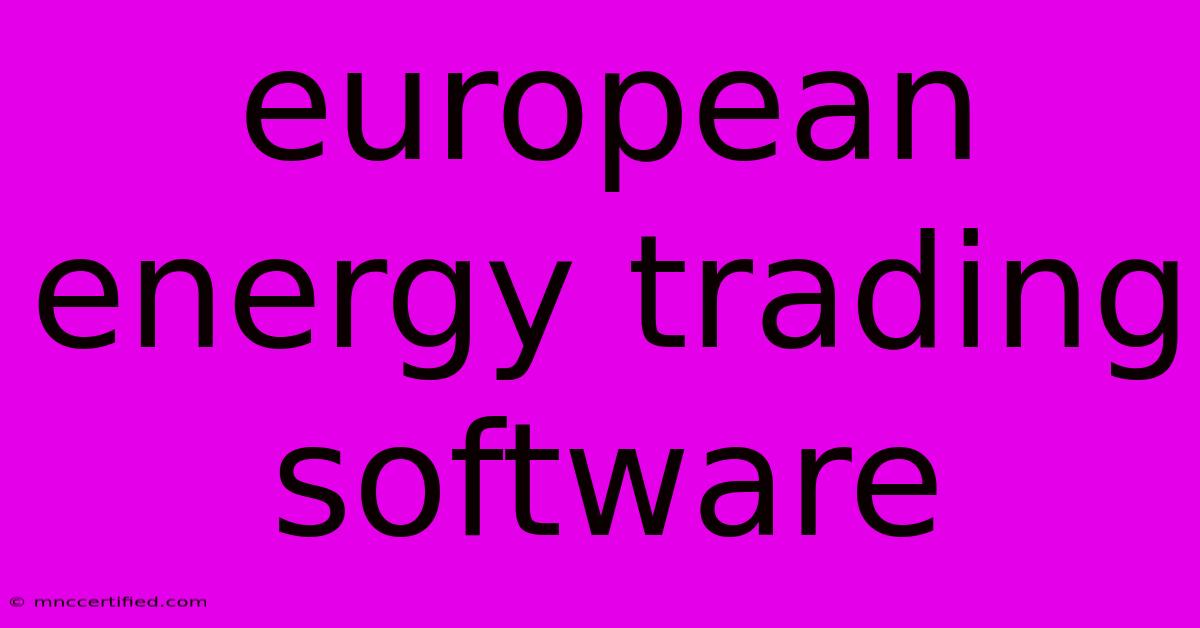European Energy Trading Software

Table of Contents
European Energy Trading Software: A Comprehensive Guide
The European energy market is a complex and dynamic landscape, demanding sophisticated software solutions for efficient trading and risk management. This guide explores the key features, benefits, and considerations for choosing the right European energy trading software for your business.
Understanding the European Energy Market's Software Needs
The European energy market is characterized by its diverse energy sources (renewable and fossil fuels), interconnected grids, and evolving regulatory frameworks. This complexity necessitates specialized software capable of handling:
- Real-time data feeds: Access to live market data, including prices, volumes, and weather forecasts, is crucial for making informed trading decisions. Software needs to integrate seamlessly with various data providers and exchanges.
- Complex trading strategies: Sophisticated algorithms and modeling capabilities are essential for optimizing trading strategies, managing risk, and maximizing profitability. This includes options for hedging, arbitrage, and portfolio optimization.
- Regulatory compliance: European energy markets are heavily regulated. Software must ensure compliance with regulations like REMIT (Regulation on Wholesale Energy Market Integrity and Transparency) and ensure accurate reporting and auditing capabilities.
- Multilingual support and cross-border functionality: Given the pan-European nature of the market, software must support multiple languages and currencies, and facilitate trading across borders seamlessly.
Key Features of Effective European Energy Trading Software
High-performing European energy trading software should incorporate these key features:
- Order Management System (OMS): A robust OMS is essential for efficient order entry, execution, and tracking. This includes features like automated order routing, algorithmic trading, and real-time order status updates.
- Risk Management System (RMS): An RMS is crucial for monitoring and mitigating various risks, such as market risk, credit risk, and liquidity risk. It should offer comprehensive reporting and analytical tools.
- Market Data Integration: Seamless integration with various market data providers ensures access to the most current and accurate information for informed trading decisions. This includes integrating with sources like EEX, EPEX SPOT, and Nord Pool.
- Trading Analytics and Reporting: Advanced analytics tools allow for in-depth analysis of trading performance, identifying trends, and optimizing strategies. Detailed reporting capabilities are vital for regulatory compliance and internal decision-making.
- Portfolio Management: Efficient tools for managing a diverse portfolio of energy contracts, including options, futures, and physical commodities. This involves features like position tracking, valuation, and margin management.
- Workflow Automation: Streamlining processes like trade confirmation, settlement, and invoicing through automation reduces operational costs and minimizes errors.
Choosing the Right European Energy Trading Software: Key Considerations
Selecting the right software requires careful consideration of various factors:
- Scalability: The software should be able to handle increasing volumes of trades and data as your business grows.
- Customization: The ability to tailor the software to your specific trading strategies and business needs is crucial.
- Integration capabilities: Seamless integration with existing systems, such as CRM, ERP, and accounting software, is vital for efficient workflows.
- Vendor support and maintenance: Reliable vendor support and regular software updates are essential for ensuring smooth operations and addressing any issues promptly.
- Security: Robust security measures are vital to protect sensitive market data and prevent unauthorized access.
The Future of European Energy Trading Software
The European energy market continues to evolve rapidly, driven by factors such as the increasing adoption of renewable energy sources, the development of smart grids, and ongoing regulatory changes. Future energy trading software will need to adapt to these changes by incorporating features such as:
- Integration with renewable energy sources: Software needs to effectively handle the intermittent nature of renewable energy and optimize trading strategies accordingly.
- Advanced analytics and machine learning: AI and machine learning will play an increasingly important role in predicting market trends, optimizing trading strategies, and mitigating risks.
- Blockchain technology: Blockchain can enhance transparency and security in energy trading, streamlining processes and reducing costs.
By carefully evaluating these factors and choosing the right software, energy trading companies can improve operational efficiency, manage risks effectively, and achieve sustainable profitability in the dynamic European energy market. Remember to thoroughly research vendors and obtain detailed demonstrations before making a decision. Investing in the right European energy trading software is a critical step towards success in this competitive market.

Thank you for visiting our website wich cover about European Energy Trading Software. We hope the information provided has been useful to you. Feel free to contact us if you have any questions or need further assistance. See you next time and dont miss to bookmark.
Featured Posts
-
Bond For Immigration Consultant
Nov 22, 2024
-
Ginger Gaetz Matt Gaetzs Spouse
Nov 22, 2024
-
Insurance Text Message Marketing
Nov 22, 2024
-
Winston Leads Browns Past Steelers
Nov 22, 2024
-
Investment Realty Springfield Mo
Nov 22, 2024